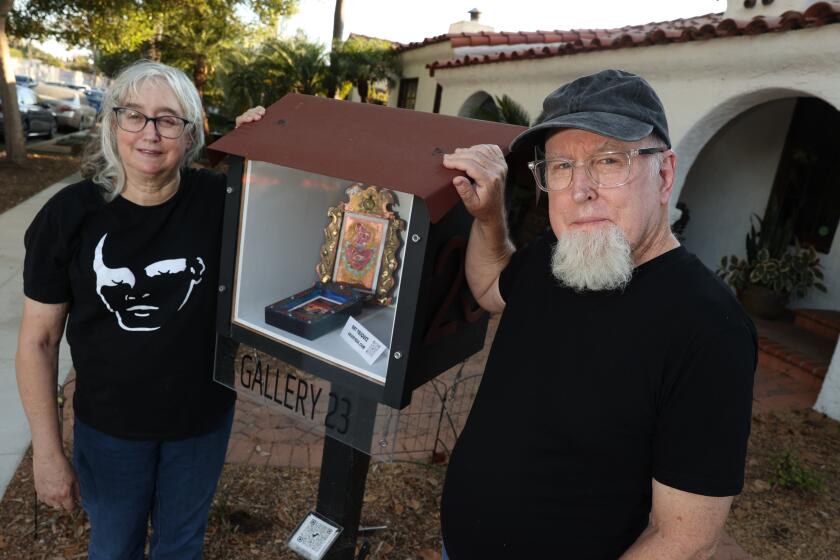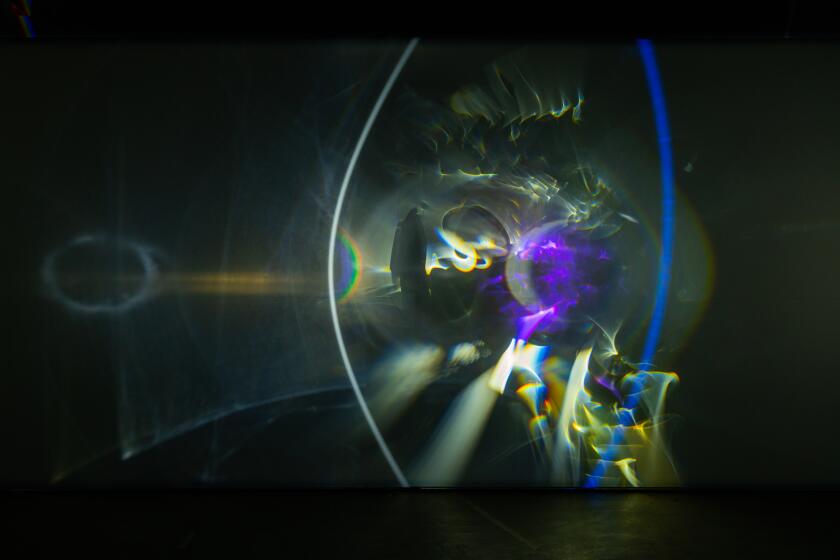(Violin) string theory at the Bowl
A remarkable run of major monuments in the classical-Romantic violin repertoire began in L.A. a few weeks ago when Joshua Bell played Bruch’s First Concerto. It signaled the start of what amounts to a crash course in the history of the 19th century violin concerto at the Hollywood Bowl (with a 20th century American classic thrown in).
On Thursday, Marin Alsop, music director of the Baltimore Symphony, conducts Gil Shaham in the Beethoven Violin Concerto with the Los Angeles Philharmonic.
Then Leonard Slatkin, music director of the Detroit Symphony, takes on the Brahms Concerto with Vadim Repin on Aug. 4 and the Tchaikovsky Concerto with Leonidas Kavakos on Aug. 6.
“These are the most popular and beloved of all the violin concertos,” Alsop said. “So it’s nice for listeners to be able to assess them back to back.”
But that’s not all. James Ehnes performs Samuel Barber’s Concerto with Bramwell Tovey, principal guest conductor of the Philharmonic at the Bowl, on Aug. 18.
In a round table comprising individual phone interviews, The Times talked with Alsop in Amsterdam, Tovey in New York and Slatkin in San Francisco as well as the world-class violinists -- Repin in Milan, Kavakos in Athens, Shaham in Aspen and Ehnes in Bradenton, Fla. -- to discuss this confluence of violin masterpieces.
The Beethoven Concerto is over 200 years old and still going strong. What makes it, along with the Brahms and Tchaikovsky, so attractive to artists and audiences?
Leonard Slatkin: All three are virtuosic, but in very different ways. The Beethoven is the mountain. It’s the one that every violinist needs to climb.
Gil Shaham: That’s a great way to describe it. I didn’t play it in public until I was in my mid-20s. I have not recorded it yet. But all three are masterpieces. They grab your attention from the very first note.
Bramwell Tovey: The Beethoven is so simple, yet it seems to contain the whole world. If I were preparing an iPod with 10 pieces to take to a desert island, I would take the Beethoven Concerto.
Marin Alsop: It’s such a pure, complete work that requires incredible control, intonation and balance. There is little room for error. Beethoven pushed the envelope of what people thought was possible in terms of length and scope, and he gives the orchestra such a prominent role, focusing on different instruments, like the timpani which starts the concerto.
Slatkin: Yes, how bold was that for the time? And there’s the Brahms Concerto, which starts with a massive introduction, as if it was going to be a symphony.
Vadim Repin: With Brahms, there’s the richness of melody, and it’s extremely gentle, despite its amazing drive. Brahms writes dolce [sweet] in the score, sometimes in unexpected places. The violinist gets a real chance to go on an intense emotional journey with an audience.
Slatkin: The Tchaikovsky is a showoff piece, beautiful, of course, but you don’t often come away remembering the orchestral contribution, as you do in the Beethoven and Brahms. In a way, it’s more about the unpredictability of what the soloist is going to do.
Leonidas Kavakos: It’s an extremely hard piece to get through just physically, because the violin takes control. But Tchaikovsky brings out this cosmopolitan atmosphere of Russia at that time. His music takes us into an elegant world of beautiful harmonies. It’s a totally different Russia from the one we hear in, say, Shostakovich’s First Concerto.
Are these works overplayed? Is it time to retire them for a few seasons so newer concertos get a chance to be heard?
Kavakos: I would never say that. As an artist, I cannot exclude the Beethoven, Brahms or Tchaikovsky. The problem is when I play only those pieces and do not propose other works.
Slatkin: The violinists themselves are going to have to carry this by saying, “I’m not going to play 10 concertos this year. I’m playing three, and I would like to play concertos by, say, Britten, Hindemith and Hartmann.”
Kavakos: Leonard should also mention that if you say this, you might end up with three concerts for the whole season, or another violinist gets the dates and you sit home. It’s a stupid way to think, but unfortunately when art becomes a profession, you have to operate in a different way.
Slatkin: The number of young violinists now is extraordinary. Perhaps that will force the issue of exploring more unusual repertoire. We can’t all make a first recording of the Bruch and Mendelssohn concertos.
Alsop: It’s important not to overplay pieces. It’s like eating the same meal every day. You want to give audiences new experiences.
James Ehnes: Really great music wears extremely well. Don’t blame the music. Maybe blame the performer for not giving an inspiring performance.
Are there newer concertos audiences should be aware of?
Tovey: Now you can have everything from André Previn’s neo-Romantic Violin Concerto to Philip Glass’ Concerto or John Adams’ “Dharma at Big Sur,” written for electric violin and orchestra. There are so many musical styles to choose from. It’s a kind of magpie generation.
Ehnes: Contemporary music is getting a better footing worldwide. Orchestras are not afraid to hire an expensive soloist to play a modern concerto. Ten years ago, it would have been box-office death. Now audiences are interested. But it’s a tricky business. There are a lot of not-great violin concertos, which makes you realize how difficult it is to write a truly great one.
Kavakos: A good composer brings something new that is attached to the past. It’s like one long line. If you try to write something new for the sake of being innovative, it doesn’t work.
Alsop: I’m a huge champion of Christopher Rouse’s Violin Concerto, and John Corigliano expanded his “Red Violin” Chaconne into a fantastic concerto. A piece grows every time a new person performs it. When Leila Josefowicz made Adams’ First Concerto her own, it transformed the way I thought about it.
Shaham: I just performed the William Bolcom Concerto with Leonard. I heard it played when I was a student at Aspen and fell in love with it.
Ehnes: There are musicians who still don’t know the Barber Violin Concerto. It has a generous and very beautiful lyricism, and there’s his unique and personal harmony.
The Barber concerto is 68 years old, young by Beethoven’s standard. Can you speculate about why some works last and others do not?
Slatkin: The pieces that have stood the test of time are beyond reproach in how they’re structured; they don’t sound like anybody else.
Kavakos: What survives goes beyond fashion, taste -- beyond aesthetics. You can find pieces from earlier centuries that are very Romantic, with wonderful themes and where everything’s conceived in a wonderful way, but there’s something lacking. That’s why those works do not win against time.
Repin: Like everything in history, there’s a cleaning up of things. Brahms lives because whatever he wrote was extremely personal, heart to heart.
More to Read
The biggest entertainment stories
Get our big stories about Hollywood, film, television, music, arts, culture and more right in your inbox as soon as they publish.
You may occasionally receive promotional content from the Los Angeles Times.










